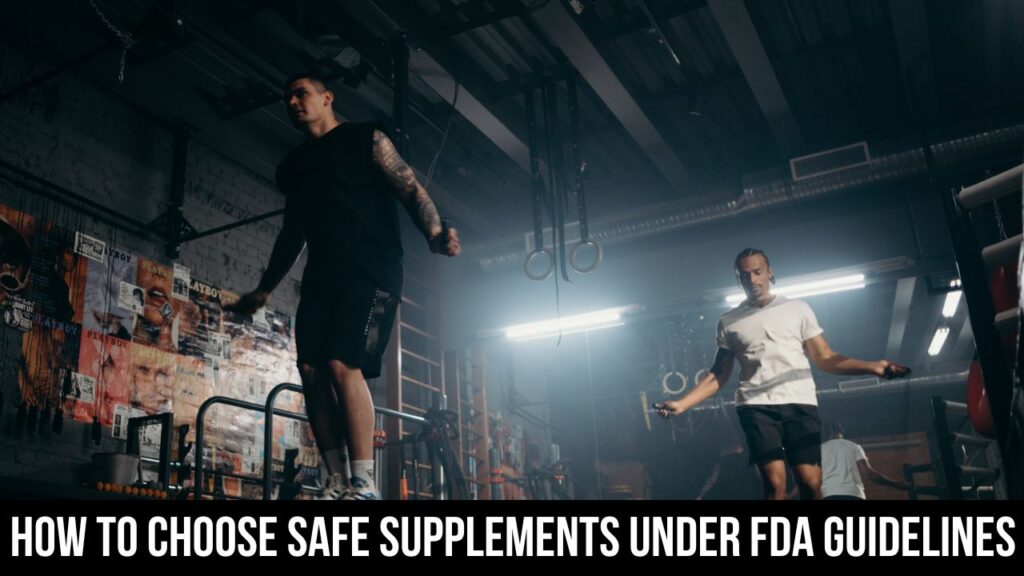How to Choose Safe Supplements Under FDA Guidelines

With thousands of dietary supplements on the market, it can be difficult to determine which ones are safe, effective, and regulated. Many people ask: Are supplements regulated by the FDA? The answer is not as straightforward as you might think.
Unlike prescription medications, dietary supplements regulated by the FDA follow different rules, meaning some products may lack proper testing or oversight before they reach consumers. Understanding these regulations is crucial to making informed choices and avoiding unsafe supplements.
In this guide, we’ll break down:
✔ How the FDA regulates supplements
✔ Which supplements are and aren’t FDA-regulated
✔ How to identify safe and effective products
✔ Red flags to watch out for when buying supplements
Are Supplements Regulated by the FDA?
Yes, but not in the same way as prescription drugs.
The U.S. Food and Drug Administration (FDA) oversees dietary supplements under the Dietary Supplement Health and Education Act (DSHEA) of 1994. However, this regulation is less strict than pharmaceutical regulations.
Key Differences Between Supplements and Drugs
| Aspect | Dietary Supplements | Prescription Drugs |
|---|---|---|
| FDA Approval Before Sale? | ❌ No | ✅ Yes |
| Clinical Trials Required? | ❌ No | ✅ Yes |
| Manufacturing Standards? | ✅ Yes (Good Manufacturing Practices - GMP) | ✅ Yes |
| Claims Must Be Verified? | ❌ No (unless false or misleading) | ✅ Yes |
| Recalls Possible? | ✅ Yes (if safety issues arise) | ✅ Yes |
💡 Pro Tip: The FDA does not test or approve supplements before they hit the market. Manufacturers are responsible for ensuring safety and labeling accuracy.
How Does the FDA Regulate Dietary Supplements?
While supplements are not pre-approved, the FDA does regulate them after they are available to consumers. Here’s how:
1️⃣ Manufacturing Oversight
- The FDA enforces Good Manufacturing Practices (GMPs) to ensure quality, consistency, and safety.
- Companies must meet labeling standards and prevent contamination.
2️⃣ Post-Market Surveillance
- The FDA monitors adverse event reports from consumers and healthcare providers.
- If a supplement causes serious health issues, the FDA can issue recalls or warnings.
3️⃣ Labeling & Health Claims
- Supplements cannot claim to cure or treat diseases.
- The FDA regulates misleading or false advertising but does not verify claims before products go on sale.
💡 Pro Tip: Look for FDA warning letters about unsafe or misbranded supplements on their official website.
Which Supplements Are Not Regulated by the FDA?
The FDA does not regulate dietary supplements in the same way as drugs, but some categories have even less oversight:
1️⃣ Herbal Supplements
- Are herbal supplements regulated by the FDA? Yes, but minimally.
- Many herbs and botanicals lack standardization, meaning their potency and purity can vary.
2️⃣ Vitamin & Mineral Supplements
- Are vitamin supplements regulated by the FDA? Yes, but not as strictly as drugs.
- Some products may contain higher or lower dosages than listed on the label.
3️⃣ Sports & Weight Loss Supplements
- High-risk category with many unapproved ingredients.
- Some contain hidden stimulants or steroids not listed on the label.
💡 Pro Tip: Avoid supplements that claim to offer "miracle results," "rapid fat loss," or "muscle growth without exercise."
How to Identify Safe Supplements
Since not all supplements are tested by the FDA, you must take extra precautions when buying them.
1️⃣ Look for Third-Party Testing
✔ NSF International – Screens for banned substances and contaminants.
✔ USP Verified – Ensures purity, potency, and good manufacturing practices.
✔ ConsumerLab – Independently tests supplement quality.
2️⃣ Check for Transparent Labeling
✔ Full ingredient list with dosages clearly stated
✔ No "proprietary blends" hiding ingredient amounts
✔ Contains FDA disclaimer: "This statement has not been evaluated by the FDA. This product is not intended to diagnose, treat, cure, or prevent any disease."
3️⃣ Avoid Supplements with These Red Flags
🚨 Claims to cure diseases (e.g., "100% cure for diabetes!")
🚨 Says "FDA Approved" (supplements cannot be FDA-approved)
🚨 No contact info or transparency about the manufacturer
💡 Pro Tip: If a supplement sounds too good to be true, it probably is. Always research before buying.
Yes, but they are not regulated like prescription drugs. The FDA enforces labeling and manufacturing standards but does not approve supplements before they are sold.
The FDA does not pre-approve herbal supplements, vitamins, weight loss pills, and bodybuilding supplements. These products are only investigated if safety concerns arise.
Herbal supplements are regulated under dietary supplement laws, meaning they do not require FDA approval before sale. However, they must follow labeling and safety regulations.
Vitamin supplements are considered food products under FDA guidelines, so they are not subject to the same approval process as prescription drugs.
If a supplement is found to be unsafe or misleading, the FDA can issue warnings, recalls, or ban specific ingredients. However, this often happens after the product is already on the market.
Final Thoughts: Choosing Safe Supplements
✔ Supplements are not FDA-approved before sale, so consumers must research carefully.
✔ Look for third-party testing and clear ingredient labels.
✔ Avoid products with false health claims or proprietary blends.
✔ Check the FDA website for warnings and recalls before purchasing.

Posts That May Interest You